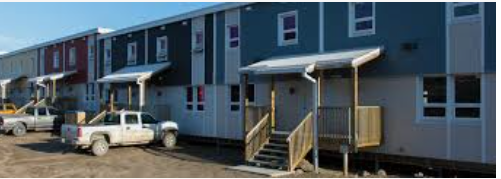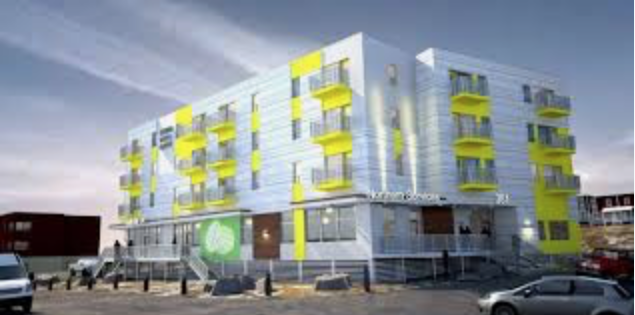Addressing the Building Fabric for Energy Efficiency
There are a few Northern private market property owners that supply apartments, town houses and commercial rental space in Nunavut. The largest is Northview REIT and Nunastar Properties Inc., with substantial holdings across Canada's North, including hotels.
Nunastar Properties Inc.
Nunastar Properties Inc. is one of the largest residential landlords with over 344 market rental apartments and townhouses in Iqaluit, Nunavut. They also offer some commercially zoned office for small businesses and not-for-profit groups. The majority of Nunastar’s holdings were built in the 1980’s, with only a few newer sections built over the last 10 years. Therefore, when they look at including energy efficiency, the majority of their improvements come through refurbishment, while some new build design technologies have been used. A conversation with Mike Powell, General Manager (Iqaluit), provides some insights on the challenges and opportunities business owners have to operate in energy efficient ways, and helping to reduce the carbon footprint.
Energy Efficiency in the Northern Refurbishment and New Build Context
As a corporate mandate, Nunastar sees the importance of being able to control the products they put into their buildings so that operate efficiency and reduce the use and cost of energy consumption across all of their buildings and with tenant usage. Nunastar has a supportive board where decisions about materials and products being brought in that cost more money than typical products, but are more efficient and will save money in time. Their building envelope is planned to be as tight as it possibly can, especially for upcoming projects. However, it is also important that staff are trained in the latest energy efficient technologies. All project staff, from the general manager, lighting, heating, contractors and administrative team, need to have the right mindset and have them thinking, “How do we make this as efficient as possible?”, rather than resisting change and relying on the status quo of old skills and outdated technologies.
Nunavut operates in a diesel fuel environment. Nunastar modernized their boiler plant to better monitor the efficiency of each boiler. Using a Smart tablet and controls, they are able to control the use of the pumps during peak times and off times, to ensure that they are not running all day long and consuming wasted energy. For example, while tenants are away at work between business hours during the week, the boilers do not need to run continuously. Given our Arctic environment, they are also noticing variation in the weather patterns, so they continuously monitor the weather to account for deep cold or warmer temperatures. What Nunastar has noticed is that with the Smart monitoring, and energy efficient approach, tenants are not opening windows anymore. This is indicating that tenants are not “over-heated” and are only adjusting their own temperature as required.
Nunastar relies on the boiler plant for energy, so they have a rigorous maintenance schedule to ensure that the boilers are working at optimal efficiency, which in turn, helps decreases fuel consumption. While everyone is exploring clean energy and renewables, the issue with using solar in the Arctic is the battery banks. For businesses and homeowners, where space is a premium in Nunavut, where would the battery banks be stored? As well, if it is categorized as a dangerous good, the cost is prohibitive if transported by air. Sealift is an option, but the time delays from ordering, shipping and receiving in late summer and fall, misses the construction window until the following year. However, storage is the biggest issue for business. Visitors from Greenland shared an energy exhaust recapture technology for heating parts of buildings, which shows other innovative approaches available for clean energy, but it is a rapidly growing field, and sharing information on the latest technology comes through professional development as a small business. There are no direct government incentives in Nunavut for greening businesses, so efforts are done within the companies for cost-efficiencies and good business. Pay the higher costs for LED lighting, building fabric and appliances now, to save in the long term.

Older assets are tough to keep energy efficient due to some of the structural components that were used in the older construction days. The problem for all business owners, or home owners in Nunavut, where the housing and building stock is sometimes over 50 years old, you can’t go back into the building to do fundamental structural or material changes. It’s not the same is working down south where you can run to a Home Depot or building suppliers, and make quick changes at a fraction of the price due to shipping and time. Nunastar can’t go back and improve the build for their older stock, but they are taking measures to be as efficient as possible. However, for their new construction, they invest is the most up-to-date building fabric and appliances moving forward.
A tool they like to use is thermal imaging. While they are putting up a building, they will use this tool before putting drywall on to see if there is hot/cool spots to be more energy efficient. The tighter the building is, the less cool air entering through drafts which increases the need for heat. Between 2017 to 2019, Nunastar renovated each floor of the 8-storey apartment building to do much-need upgrades in the apartments and office space. Nunastar invested $1 million per floor to make each unit and the whole building more energy efficient. To make it more efficient they addressed the basic insulation level by using spray foam to achieve a tighter seal and address prior uncontrolled air leakage. A new fresh air intake has been added to the hotel for improved ventilation and to help cool down the building.
Nunastar uses water saving technology in their new buildings, as well as their other buildings when renovations are required, to limit water wastage. This includes using water saving toilet technology and water efficient shower heads. Nunastar has also been able to fix pipes that have had slow leaks for years. They have done this to eliminate wastewater while improving water quality and also keeping in mind the water reserve. With low water supply experienced in Iqaluit and due to shifts from climate change, there is no room for wasted water.
Using Smart technology has been the key tool that has enabled Nunastar to reliably control heating and energy consumption. This is important because they can fix a problem before it happens, while also being able to collect data with these controls. Nunastar can monitor behaviour of the tenants because if windows are being left open to cool down units, then it lets Nunastar know and can adjust immediately to make adjustments.

This picture shows the energy efficient building wrap used in Nunastar's current new build project on the old CBC and RCMP Detatchment space on Astro Hill in Iqaluit, Nunavut.
Businesses have to have the right people and the leadership to be energy efficient. It’s a business decision that is the right thing to do, and also saves money for the customer and the business operating budget.

Copyright © All Rights Reserved

